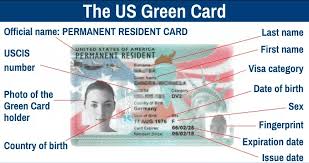USA Green Card Application: A Comprehensive Guide
Introduction
USA Green Card Application: The United States is a global hub for opportunities, attracting individuals from all corners of the world. The U.S. Green Card, formally known as the Permanent Resident Card, is a highly sought-after document that grants foreign nationals the right to live and work permanently in the United States.
With its many benefits, including the ability to sponsor family members and eventually apply for U.S. citizenship, the Green Card is an essential milestone for many immigrants.
This article provides an in-depth exploration of the Green Card application process, the types of Green Cards, eligibility criteria, and some of the challenges and intricacies applicants may face.
Whether you are an aspiring immigrant, a student, or a professional, this guide will walk you through the entire process.
What is a Green Card?
A Green Card serves as proof of an individual’s permanent resident status in the United States. It is a physical card that allows its holder to live and work freely in the country.
The card must be renewed every 10 years, but the permanent residency status is ongoing as long as the cardholder meets the required legal conditions, such as maintaining residency and not committing certain crimes.
Benefits of a Green Card
Obtaining a Green Card comes with numerous benefits, such as:
- Work Authorization: Green Card holders can work for any employer in the U.S. without restrictions, unlike visa holders who may be limited to specific employers.
- Path to Citizenship: After holding a Green Card for five years (or three years if married to a U.S. citizen), the holder may apply for naturalization to become a U.S. citizen.
- Social Security and Medicare: Green Card holders are entitled to Social Security benefits and Medicare, provided they have worked in the U.S. for the required number of years.
- Family Sponsorship: Green Card holders can sponsor their spouse and unmarried children under 21 to obtain their Green Cards.
- Freedom of Travel: Permanent residents can travel internationally without losing their status, though there are restrictions on how long they can remain outside the U.S.
Types of Green Cards
There are several ways to obtain a Green Card, with each pathway tailored to different categories of individuals. The most common types of Green Cards are based on family relationships, employment, refugee or asylum status, and the diversity visa lottery. Below are the main categories:
1. Family-Based Green Cards
Family-based Green Cards allow U.S. citizens and lawful permanent residents to sponsor their immediate relatives. The two main groups are:
- Immediate Relatives: These include spouses, unmarried children under 21, and parents of U.S. citizens. There are no numerical limitations on visas for immediate relatives.
- Family Preference Categories: These include more distant relatives, such as siblings of U.S. citizens and the spouses and children of Green Card holders. Visas for family preference categories are subject to numerical caps, meaning wait times can be long.
2. Employment-Based Green Cards
Employment-based Green Cards are available for individuals with job offers from U.S. employers, those with extraordinary skills, or investors. They are divided into several preference categories:
- EB-1: For individuals with extraordinary ability in their field, outstanding professors and researchers, or multinational executives.
- EB-2: For professionals with advanced degrees or exceptional abilities.
- EB-3: For skilled workers, professionals, and other workers.
- EB-4: For special immigrants, such as religious workers or U.S. Armed Forces members.
- EB-5: For investors who invest at least $1.8 million (or $900,000 in targeted employment areas) in a U.S. business that creates jobs.
3. Diversity Visa Lottery
The Diversity Visa (DV) Lottery is a program that offers 50,000 Green Cards annually to individuals from countries with historically low immigration to the U.S. Applicants must meet certain educational or work experience requirements. The lottery is random, and winners can apply for a Green Card.
4. Refugee or Asylum Status
Individuals who have been granted asylum or refugee status can apply for a Green Card after one year of residing in the U.S. as a refugee or asylee. This category applies to those fleeing persecution based on race, religion, nationality, or political opinions.
5. Other Categories
Several other specialized categories exist, such as Green Cards for victims of human trafficking or abuse, and special immigrant juveniles.
Green Card Eligibility
Eligibility for a Green Card depends on the category under which the application is filed. However, there are general requirements that all applicants must meet:
- Eligibility Based on a Specific Category: Applicants must qualify under one of the Green Card categories, such as family-based, employment-based, or humanitarian grounds.
- Admissibility: Individuals must be deemed “admissible” to the U.S., which includes passing criminal background checks and medical examinations. Those with certain criminal convictions or communicable diseases may be denied.
- Maintaining Status: Some applicants, especially those already in the U.S. on a visa, must maintain their lawful status throughout the application process.
Green Card Application Process
The Green Card application process can vary depending on the applicant’s current situation and the category under which they are applying. However, the general steps are as follows:
1. Determine Your Eligibility
The first step is to identify under which category you are eligible to apply. For family-based applications, this may involve verifying a qualifying relationship with a U.S. citizen or permanent resident. For employment-based applications, it involves securing a job offer from a U.S. employer.
2. File an Immigrant Petition
In most cases, an immigrant petition must be filed on the applicant’s behalf. For family-based applications, this involves the U.S. citizen or permanent resident sponsor filing Form I-130, Petition for Alien Relative.
For employment-based applications, the employer usually files Form I-140, Immigrant Petition for Alien Worker. In some categories, such as EB-1 for individuals with extraordinary abilities, the applicant may self-petition.
3. Wait for Visa Availability
Once the immigrant petition is approved, the applicant must wait for an immigrant visa to become available. Immediate relatives of U.S. citizens do not have to wait, as visas are always available for them.
However, family preference and employment-based categories have annual visa caps, so applicants may face long wait times, especially for countries with high demand, such as India and China.
4. File Form I-485 (Adjustment of Status) or Consular Processing
After the visa becomes available, applicants must apply to adjust their status if they are already in the U.S., or they must go through consular processing if they are outside the U.S.
- Adjustment of Status: Applicants in the U.S. file Form I-485, Application to Register Permanent Residence or Adjust Status, to apply for a Green Card without leaving the country.
- Consular Processing: Applicants outside the U.S. must apply for a Green Card through the U.S. embassy or consulate in their home country. This involves attending an interview and providing supporting documents.
5. Attend Biometrics Appointment
Applicants are required to attend a biometrics appointment, where their fingerprints, photographs, and signatures are collected. This information is used to perform a background check.
6. Attend an Interview
Most Green Card applicants must attend an interview at a U.S. Citizenship and Immigration Services (USCIS) office or a U.S. consulate. During the interview, the officer will ask questions to confirm the applicant’s eligibility and ensure the application is truthful.
7. Receive Decision
After the interview, USCIS or the consulate will make a decision on the application. If approved, the applicant will receive their Green Card. If denied, they will be provided with the reasons for the denial and may be able to appeal the decision.
Green Card Renewal and Conditions
Green Cards must be renewed every 10 years. If the card is about to expire, or if it has already expired, holders can file Form I-90, Application to Replace Permanent Resident Card. Conditional Green Cards, which are issued to individuals who have been married for less than two years at the time of approval, must file Form I-751 to remove the conditions.
Challenges and Delays in the Application Process
While obtaining a Green Card offers numerous benefits, the process can be complex and time-consuming. Common challenges include:
- Backlogs and Wait Times: Family preference and employment-based categories have annual limits on visas, causing backlogs. Countries like India and China often have extended wait times due to the high volume of applicants.
- Documentation Requirements: The application requires extensive documentation, including proof of relationships, job offers, or refugee status. Missing or incomplete documents can lead to delays or denials.
- Interview and Background Checks: Applicants may be subject to extensive interviews and background checks. Failing to meet admissibility criteria can result in application denial.
Conclusion
The journey to obtaining a U.S. Green Card is often long and filled with complexities, but the rewards are significant. With a Green Card, individuals can live, work, and study in the U.S. indefinitely, access social benefits, and even apply for U.S. citizenship.
While the process can be daunting, understanding the eligibility criteria, filing the correct forms, and following the application process carefully can help increase the chances of success.
For those dreaming of a permanent life in the U.S., the Green Card remains a crucial and attainable goal. By navigating the process patiently and accurately, applicants can take meaningful steps toward achieving their American dream.






